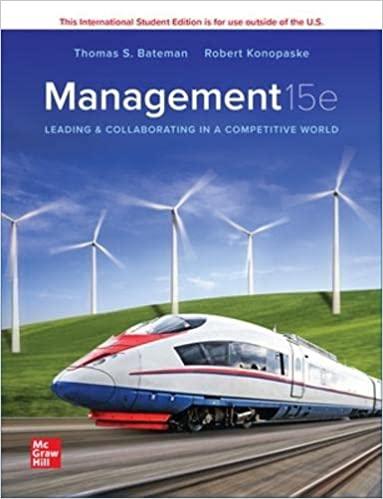1. Identify an entrepreneur in your area you would like to interview. 2. Contact the person you...
Question:
1. Identify an entrepreneur in your area you would like to interview.
2. Contact the person you have selected and make an appointment. Be sure to explain why you want the appointment and to give a realistic estimate of how much time you will need.
3. Identify specific questions you would like to have answered and the general areas about which you would like information. (See the following suggested interview questions, although there probably won’t be time for all of them.) Using a combination of openended questions—such as general questions about how the entrepreneur got started, what happened next, and so forth—and closed-ended questions—such as specific questions about what his or her goals were, if he or she had to find partners, and so forth—will help keep the interview focused yet allow for unexpected comments and insights.
4. Conduct the interview. If both you and the person you are interviewing are comfortable, using a small voice recorder during the interview can be of great help to you later. Remember, too, that you most likely will learn more if you are an interested listener.
5. Evaluate what you have learned. Write down the information you have gathered in some form that will be helpful to you later on. Be as specific as you can. Jotting down direct quotes is more effective than statements such as “highly motivated individual.” Also be sure to make a note of what you did not find out.
6. Write a thank-you note. This is more than a courtesy; it will also help the entrepreneur remember you favorably should you want to follow up on the interview.
Suggested Interview QUESTIONS FOR GATHERING INFORMATION
• Would you tell me about yourself before you started your first venture?
Were your parents, relatives, or close friends entrepreneurial? How so?
Did you have any other role models?
What was your education/military experience? In hindsight, was it helpful? In what specific ways?
What was your previous work experience? Was it helpful?
What particular chunks of experience were especially valuable or relevant?
In particular, did you have any sales or marketing experience?
How important was this in starting your company?
• How did you start your venture?
How did you spot the opportunity? How did it surface?
What were your goals? What were your lifestyle or other personal requirements? How did you fit these factors together?
How did you evaluate the opportunity in terms of the critical elements for success? The competition? The market?
Did you find or have partners? What kind of planning did you do? What kind of financing did you have?
Did you have a start-up business plan of any kind? Please tell me about it.
How much time did it take from conception to the first day of business? How many hours a day did you spend working on it?
How much capital did it take? How long did it take to reach a positive cash flow and break-even sales volume?
If you did not have enough money at the time, what were some ways in which you “bootstrapped” the venture (i.e., bartering, borrowing, and the like)? Tell me about the pressures and crises during that early survival period.
What outside help did you get? Did you have experienced advisers? Lawyers? Accountants? Tax experts?
Patent experts? How did you develop these networks and how long did it take?
What was your family situation at the time?
What did you perceive to be your own strengths? Weaknesses?
What did you perceive to be the strengths of your venture? Weaknesses?
What was your most triumphant moment? Your worst moment?
Did you want to have partners or do it solo? Why?
• Once you got going ... What were the most difficult gaps to fill and problems to solve as you began to grow rapidly?
When you looked for key people as partners, advisers, or managers, were there any personal attributes or attitudes you were especially seeking because you knew they would fit with you and were important to success?
How did you find them?
Are there any attributes among partners and advisers that you would definitely try to avoid?
Have things become more predictable? Or less?
Do you spend more/same/less time with your business now than in the early years?
Do you feel more managerial and less entrepreneurial now?
In terms of the future, do you plan to harvest? To maintain? To expand?
Do you plan ever to retire? Would you explain?
Have your goals changed? Have you met them?
QUESTIONS FOR CONCLUDING (CHOOSE ONE)
• What do you consider your most valuable asset—the thing that enabled you to make it?
• If you had to do it over again would you do it again in the same way?
• Looking back, what do you feel are the most critical concepts, skills, attitudes, and know-how you needed to get your company started and grown to where it is today?
What will be needed for the next five years? To what extent can any of these be learned?
• Some people say there is a lot of stress being an entrepreneur.
What have you experienced? How would you say it compares with other hot-seat jobs, such as the head of a big company or a partner in a large law, consulting, or accounting firm?
• What are the things that you find personally rewarding and satisfying as an entrepreneur? What have been the rewards, risks, and trade-offs?
• Who should try to be an entrepreneur? Can you give me any ideas there?
• What advice would you give an aspiring entrepreneur? Could you suggest the three most important lessons you have learned? How can I learn them while minimizing the tuition?
Step by Step Answer:

Management Leading And Collaborating In A Competitive World
ISBN: 9781265051303
15th International Edition
Authors: Thomas S Bateman, Scott A Snell, Robert Konopaske





